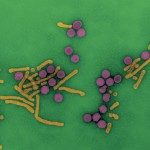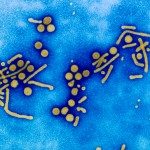Link to Pubmed [PMID] – 23212909
J. Biol. Chem. 2013 Jan;288(3):1785-94
Arkadia is a RING-based ubiquitin ligase that positively regulates TGF-β signaling by targeting several pathway components for ubiquitination and degradation. However, little is known about the mechanisms controlling Arkadia activity. Here we show that the LIM-only protein FHL2 binds and synergistically cooperates with Arkadia to activate Smad3/Smad4-dependent transcription. Knockdown of FHL2 by RNA interference decreases Arkadia level and restricts the amplitude of Arkadia-induced TGF-β target gene responses. We found that Arkadia is ubiquitinated via K63- and K27-linked polyubiquitination. A single mutation at the RING domain that abolishes the E3 activity diminishes Arkadia ubiquitination, indicating that this modification partly involves autocatalytic process. Mutation of seven lysines at the C-terminal region of Arkadia severely impairs ubiquitination through the K27 but not the K63 linkage and slows down the turnover of Arkadia, suggesting that K27-linked polyubiquitination might promote proteolysis-dependent regulation of Arkadia. We show that FHL2 increases the half-life of Arkadia through inhibition of ubiquitin chain assembly on the protein, which provides a molecular basis for functional cooperation between Arkadia and FHL2 in enhancing TGF-β signaling. Our study uncovers a novel regulatory mechanism of Arkadia by ubiquitination and identifies FHL2 as important regulator of Arkadia ubiquitination and TGF-β signal transduction.



